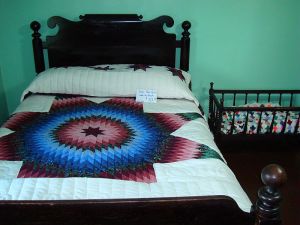
inside Henry David Thoreau’s cabin in Walden Pond, Massachusetts
Today’s blog post is about minimalism and decluttering, two topics that are relevant for a zero waste lifestyle.
Minimalism is an often misunderstood concept in that many people equal it with a nearly empty apartment or owning virtually nothing, a notion that is often strengthened in the public opinion by the many prominent internet-nomads who are usually also minimalists by necessity, but who actually just follow an ‘extreme’ form of minimalism due to their lifestyle and frequent changes of location. In fact, minimalism means owning only that what you really need and use regularly, but nothing more, but also nothing less; so basically a lifestyle without superfluous possessions. So leading a minimalist lifestyle does not necessarily mean having a nearly empty apartment and it does not mean a life in poverty or in want either. When you lead a minimalist life, you value each and every object you possess – the ‘chosen few’ – and use all of them on a regular basis.
Minimalism is related to a zero-waste lifestyle, since both lifestyles aim to reduce the superfluous, be it non-necessary packaging or ‘stuff’, and reduce things to the essential only. And ‘stuff’ that is only lying around and which you never, rarely ever or no longer use is a wasted resource. So a zero-waste lifestyle will sooner or later lead to decluttering.
Things that are still in working order and in acceptable condition ought to be donated or given away to people who are in need and could put them to good use, not thrown away! Even in the ‘wealthy’ western countries, there are plenty of poor and needy people who can barely get by and who might just be looking for the thing that is only superfluous clutter for you.
When you declutter and want to find out which things really matter to you – which might be clear for some things, but not so straightforward for others – ask yourself these questions:
– Does this object spark pleasant feelings and joy when I take it into my hand or when I see it?
– Is it beautiful?
– Do I use it on a regular basis and is it (still) useful to me?
– Is it worth the space it is taking up?
If your answer to one of these questions is ‘no’, think about getting rid of it. You will probably find that you will have to go through your possessions several times, with a gap of several weeks or months in between, because of the ‘sentimental’ bonds you might have formed with some objects, which might no longer be of use to you now. This is just natural. To be able to part with them, you will first have to develop a ‘sentimental detachment’ from the object. This is best done by putting the objects in question into a box which you then put away into a cupboard or similar for some weeks before opening the box again. The purpose of this ‘exercise’ is to see how it feels when the object is no longer there (even if by trial) and if you miss it. When you open the box again after a few weeks and you don’t even remember (all of) the objects inside any more and have not missed them, then you can give them away without regrets. With other objects, it might be more difficult to part with – on the one hand you realize rationally that they no longer serve you or that they are only standing around unused collecting dust even though they might be beautiful and that you ought to give them away, but on the other you think you must hold on to them for some reason (‘it is so beautiful’, ‘it reminds me of….’, etc.). In this case, repeat the ‘box-exercise’ several times. Even if you feel you must keep the object after the first time in the box, your feelings for the object might change in the course of time and you might feel you can give the object away without regrets after a subsequent time in the box.
Another thing worth keeping in mind, especially for things that are strictly speaking ‘clutter’ but with which one might have developed a ‘sentimental’ bond or connection, is that one often values such an object not for its ‘use-value’ or intrinsic value, but for the memories it triggers or which one connects with it. If this is the case, ask yourself if you really do need to keep the physical object or whether keeping a photo of it might not suffice. The photo of the object would then be able to keep alive the memories you have associated with it without taking up unnecessary and precious space. The same is true for (physical) photos and letters, etc. for which many people harbour sentimental feelings – ask yourself if a scan or digital copy of them, or of a selection of them, would not suffice and if you really need to keep all 687 of them.
If you still find it difficult to part with some objects that are no longer of use to you, try to ‘thank’ the object in question for the time it has served you well, but which is now over, e.g. because your circumstances of life or interests have changed or because you might no longer be able to practise a sport or other activity because of some injury or similar or because you live too far away from a suitable location (away from the mountains or the sea). Parting with things that have become ‘stuff’ and ‘clutter’ is often also so difficult because it means giving up an identity, or a part of it, that we have imagined for ourselves, but which no longer holds true for our current life. For example, you might always have imagined yourself as, or wanted to be, a great guitarist or drummer or athlete and bought all the necessary gear for it, and you might have pursued that interest for a while, but then your circumstances changed and you no longer found the time or moved away, so the interest gradually waned or disappeared over the years until the gear became ‘clutter’. Acknowledge this phase of your life, ‘thank’ the gear or objects for trying to help you pursue this dream or part of your (imagined) identity, but then let it go to make space for a ‘new’ identity or picture of yourself. If necessary, keep a photo of the things.
A good article on simple living and its philosophical basis: https://en.wikipedia.org/wiki/Simple_living

Awesome! I read the KonMari method and am currently in a big decluttering marathon. It’s exhausting but worth it! I’m already noticing more of my time freeing up, and I’ve only finished one room.
LikeLiked by 1 person
glad to hear you liked the article 🙂 and yes, decluttering is liberating in so many ways, freeing up both time and space for new things and new growth 🙂
LikeLike